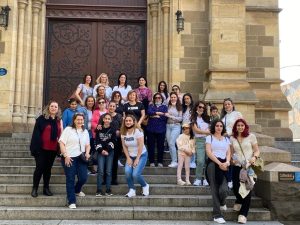Refugees feel safe and welcome – survey finds
Syrian, Iraqi and Afghan refugees who arrived in Australia fleeing conflicts in their homelands have been on a trajectory towards happiness, employment and citizenship, a new survey has found.
The ‘Longitudinal Study of Refugee Families’ carried out by researchers at the University of Technology Sydney (UTS) and migrant and refugee settlement agency AMES Australia, tracked the experiences of refugees from Syria and Iraq in three surveys over four years since 2018.
The survey found that after four years in Australia the refugees had gained an understanding of Australian ways and culture, made friends locally, improved their English and most had found work.
 It also found the refugees overwhelming felt safe, they felt Australia was a good place to bring up children who largely were flourishing in school and they were forging identities as Australians.
It also found the refugees overwhelming felt safe, they felt Australia was a good place to bring up children who largely were flourishing in school and they were forging identities as Australians.
After four years, 55 per cent of refugees surveyed who were looking for work had secured employment, up from just 14 per cent after one year, the study said.
These figures were similar to Syrian-conflict refugees who settled in Canada.
The study found 91 per cent of the refugees surveyed said they were ‘mostly’ or ‘very’ happy.
“Muslim refugees – mostly from Afghanistan – were the happiest about life in Australia, increasing from 80 per cent in Round 1 to 95 per cent in Round 3,” the study said.
English language proficiency has improved among the survey participants over the four years.
“In Round 1, about half of those surveyed – Afghan (48 per cent), Syrian (50 per cent) and Iraqi (52 per cent) – reported that they understood English ‘well to very well’,” the study said.
“Four years later by Round 3 this increased to 80 per cent of Syrian and 81 per cent of Iraqi refugees compared to 55 per cent of Afghan refugees,” it said.
The study found that after four years, 76 per cent of the participants found it easy to make friends and 68 per cent said it was easy to talk to their neighbours; and 90 per cent agreeing that people in their neighbourhood were friendly.
Ninety-eight per cent of participants said they felt safe in Australia 97 per cent felt it was a good place to bring up children.
Students surveyed overwhelming said their educational experience was positive, the study found.
“In Round 1, 77 per cent of refugee youth surveyed rated their educational experience as ‘very good’ to ‘excellent’. This rose to 87 per cent in the Round 2 survey, though fell slightly to 84 per cent by Round 3, probably because of the impact on COVID on schooling,” the study said.
Two in three young refugees surveyed said they felt a sense of belonging inn Australia and almost all participants said they were keen to become Australian citizens.
The researchers also found that regional settlement of refugees had been largely successful. They also found that the refugee families were overwhelmingly thankful for – and praising of – the on-arrival services of the service providers, such as AMES Australia.
AMES CEO Cath Scarth said the research showed the families feel safe and welcome living in Australia.
“We can they feel happy living in Australia and are very optimistic about their future in Australia,” Ms Scarth said.
“They are universally thankful to Australians for giving then a new beginning to life and want to repay Australia by taking out Australian citizenship as soon as it is available.
“More than two thirds identify as Australian and feel that they belong here. Young refugees have settled very quickly and have definite aspirations for their future in Australia,” Ms Scarth said.
Syrian refugee Norma Medawar, who arrived in Australia in 2014 fleeing the civil war in her homeland, said she now felt Australia was her home.
“We have a great life in Australia now. We are safe, we have jobs and homes and our children can have bright futures,” said Norma, who recently visited Syria.
“While Syria will always be in my heart, Australia is now my home,” she said.












